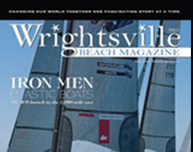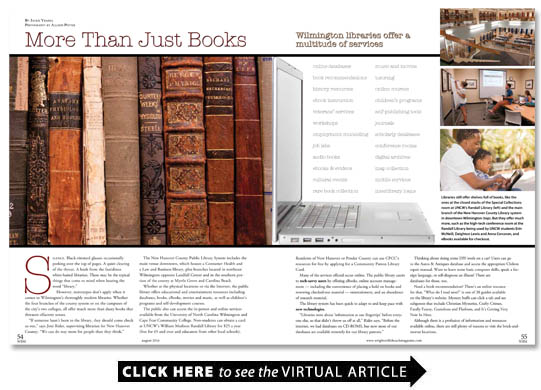More Than Just Books
BY Jackie Ybarra
Silence. Black-rimmed glasses occasionally peeking over the top of pages. A quiet clearing of the throat. A hush from the fastidious white-haired librarian. These may be the typical things that come to mind when hearing the word “library.”
However stereotypes don’t apply when it comes to Wilmington’s thoroughly modern libraries. Whether the four branches of the county system or on the campuses of the city’s two colleges all offer much more than dusty books that threaten olfactory senses.
“If someone hasn’t been to the library they should come check us out ” says Jimi Rider supervising librarian for New Hanover County. “We can do way more for people than they think.”
The New Hanover County Public Library System includes the main venue downtown which houses a Consumer Health and a Law and Business library plus branches located in northeast Wilmington opposite Landfall Center and in the southern portion of the county at Myrtle Grove and Carolina Beach.
Whether at the physical locations or via the Internet the public library offers educational and entertainment resources including databases books eBooks movies and music as well as children’s programs and self-development courses.
The public also can access the in-person and online services available from the University of North Carolina Wilmington and Cape Fear Community College. Non-students can obtain a card at UNCW’s William Madison Randall Library for $25 a year (free for 65 and over and educators from other local schools). Residents of New Hanover or Pender County can use CFCC’s resources for free by applying for a Community Patron Library Card.
Many of the services offered occur online. The public library caters to tech-savvy users by offering eBooks online account management — including the convenience of placing a hold on books and renewing checked-out material — entertainment and an abundance of research material.
The library system has been quick to adapt to and keep pace with new technologies.
“Libraries were about ?information at our fingertips’ before everyone else so that didn’t throw us off at all ” Rider says. “Before the internet we had databases on CD-ROMS but now most of our databases are available remotely for our library patrons.”
Thinking about doing some DIY work on a car? Users can go to the Autos & Antiques database and access the appropriate Chilton repair manual. Want to learn some basic computer skills speak a foreign language or self-diagnose an illness? There are databases for those too.
Need a book recommendation? There’s an online resource for that. “What do I read next?” is one of 38 guides available on the library’s website. Mystery buffs can click a tab and see subgenres that include Christian Mysteries Crafty Crimes Fatally Funny Gumshoes and Flatfoots and It’s Getting Very Noir In Here.
Although there is a profusion of information and resources available online there are still plenty of reasons to visit the brick-and-mortar locations.
The main public library downtown Wilmington houses what is considered one of the best local history resources in the state. The North Carolina Room includes material from throughout the state but the emphasis is on southeastern North Carolina. Much of the collection has been handed down through several former public and private collections dating back to the Cape Fear Library of 1760. Patrons can research topics including Wilmington history genealogy historic homes and the N.C. film industry.
Technology has made it possible to use the library from home but patronage has not suffered at the physical locations where the human touch prevails. Librarians perform the old-fashioned services of directing patrons to the right section so they can find the book they’re looking for to sign them up for a library card and of course to check out books.
“People from all walks of life visit the library from babies to elderly ” Rider says. “We try to educate and steer people toward good resources.”
They can also help people adapt to new technology.
“Some well-meaning family members will buy their relatives Kindles but they still have trouble learning how to use them ” Rider says.
Librarians had to learn how to use them as well. Now they will instruct others either in classes or by appointment at request.
Although eBooks are increasingly popular and available for virtual checkout when it comes to borrowing nothing seems to beat that old-book smell.
“Our circulation of print books is still higher than our circulation of eBooks and we hear from many patrons all of the time that they still want to hold a physical book in their hands ” Rider says.
The amenities extend well beyond books.
The main library offers a veterans services workshop every third Friday of the month. Counselors with the N.C. Department of Commerce Division of Workforce Solutions assist military veterans with resumes job placement VA benefits and insurance and health care.
Rider says the counselors often ask around the library for others who may not be veterans but are still in need of help seeking employment and instruction.
Job labs are available to all patrons who are in need of the skill sets to find work. Subjects like basic computer knowledge how to use the Internet setting up email and how to find employment listings are just a few of the things taught.
“There are a lot of people that we do not serve that we could serve ” Rider says. “Many people don’t know all that libraries have to offer even though we try hard to get the word out there.”
Children’s programs aimed at instilling a love of reading helping with literacy and preparing boys and girls for a lifetime of learning are a major emphasis. Story times are held each week at all branches where children can hear and engage in the tales. Other resources include a Ready to Read program aimed at giving preschoolers reading skills before they enter school and a parent toolkit that helps moms and dads keep track of their kids’ progress.
The library also offers education resources for all ages including access to a website called tutor.com where students can access an online tutor for free and Gale Courses which are free interactive online classes that last for six weeks. Topics range from Business and Finance to Writing and Publishing.
Anyone whose interest is piqued by writing and publishing can progress to innovative and useful tools like SELF-e and Press Books. SELF-e allows local authors to self-publish and distribute eBooks to patrons of the library with no checkouts or returns as well as no multi-user limitations. Press Books allows authors to customize their work for both eBooks and print formats.
“We have a lot of good authors in Wilmington and we had been trying to come up with ways to help ” Rider says. “SELF-e was a great fit for us.”
For patrons who can’t make it to the library because of age health or physical limitations the library will come to them. The ALOHA program (Adult Library Outreach for the Homebound and Aged) is a free service that delivers books large-print editions audio books on CD and DVDs to users’ homes usually once a month.
The library also delivers materials to nursing facilities.
Like the public libraries Wilmington’s colleges also offer an abundance of resources.
At UNCW’s William Madison Randall Library students have access to many tools to help with their coursework.
“The library’s resources include articles journals popular and scholarly databases books eBooks (increasingly essential to academic library collections) government information in all formats media theses digital collections and more ” librarian Sarah Watstein says. “Research guides tools and apps help students find resources to meet their information reference or research needs. Interlibrary loan services provide a means for students to obtain books or journals that the library either does not own or have online access to.”
There’s also multimedia-equipped conference rooms group study areas and to help students stay awake while studying a Port City Java location inside the library.
Non-students with a library card can check out books DVDs and CDs but the most important community resource might be the extensive University Archives and Special Collections.
The archives deal with the history of UNCW while the Special Collections detail the history and heritage of the Cape Fear region through rare books manuscripts maps and other media. Much of the material in the archives is available online but a personal visit is required to view the Special Collections.
Like the other libraries in the county CFCC has ample resources outside of general circulation books. Available are thousands of eBooks offering full text reference and scholarly books an “ebrary ” which contains eBook titles supporting student and faculty research and general nonfiction titles on topics including school and studying career development arts and leisure and practical life skills as well as over 1 000 audio book titles.
The CFCC library offers extensive searchable databases. Several offer career guidance including one on top careers with a two-year degree.
In keeping with the times eVideos are also available. American History Films on Demand and PBS video are some of the resources that can be viewed online.

